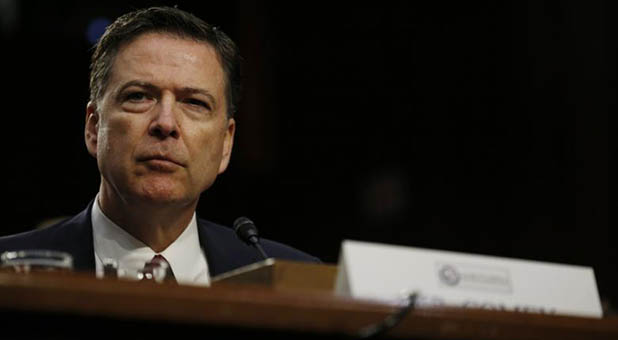DOJ: James Comey Lied
Following former FBI Director James Comey’s testimony Thursday before the Senate Intelligence Committee, the Department of Justice issued the following statement in which it asserts the director lied about several key matters relating to the investigation into alleged Russian collusion into the 2016 presidential election, Attorney General Jeff Sessions’ recusal from the investigation, and Comey’s meetings with President Donald Trump.
The statement reads:
Shortly after being sworn in, Attorney General Sessions began consulting with career Department of Justice ethics officials to determine whether he should recuse himself from any existing or future investigations of any matters related in any way to the campaigns for president of the United States.
Those discussions were centered upon 28 CFR 45.2, which provides that a Department of Justice attorney should not participate in investigations that may involve entities or individuals with whom the attorney has a political or personal relationship. That regulation goes on to define “political relationship” as:
“[A] close identification with an elected official, a candidate (whether or not successful) for elective, public office, a political party, or a campaign organization, arising from service as a principal adviser thereto or a principal official thereof …”
Given Attorney General Sessions’ participation in President Trump’s campaign, it was for that reason, and that reason alone, the attorney general made the decision on March 2, 2017, to recuse himself from any existing or future investigations of any matters related in any way to the campaigns for president of the United States.
In his testimony, Mr. Comey stated that he was “not … aware of” “any kind of memorandum issued from the Attorney General or the Department of Justice to the FBI outlining the parameters of [the Attorney General’s] recusal.” However, on March 2, 2017, the Attorney General’s Chief of Staff sent the attached email specifically informing Mr. Comey and other relevant Department officials of the recusal and its parameters, and advising that each of them instruct their staff “not to brief the Attorney General … about, or otherwise involve the Attorney General … in, any such matters described.
During his testimony, Mr. Comey confirmed that he did not inform the Attorney General of his concerns about the substance of any one-on-one conversation he had with the President. Mr. Comey said, following a morning threat briefing, that he wanted to ensure he and his FBI staff were following proper communications protocol with the White House. The Attorney General was not silent; he responded to this comment by saying that the FBI and Department of Justice needed to be careful about following appropriate policies regarding contacts with the White House.
Despite previous inaccurate media reports, Mr. Comey did not say that he ever asked anyone at the Department of Justice for more resources related to this investigation.
In conclusion, it is important to note that after his initial meeting with career ethics officials regarding recusal (and including the period prior to his formal recusal on March 2, 2017), the Attorney General has not been briefed on or participated in any investigation within the scope of his recusal.
Lying to Congress while under oath is punishable as perjury. As an attorney, Comey could be disbarred if it is proven that he willfully provided testimony that was not true. President Trump’s personal attorney has also asserted several key areas of the former director’s testimony was not true, although it is unclear how Special Counsel Robert Mueller, Comey’s predecessor as FBI director, will address these allegations.
Mueller’s commission allows him to investigate and prosecute any criminal activity he discovers.














































